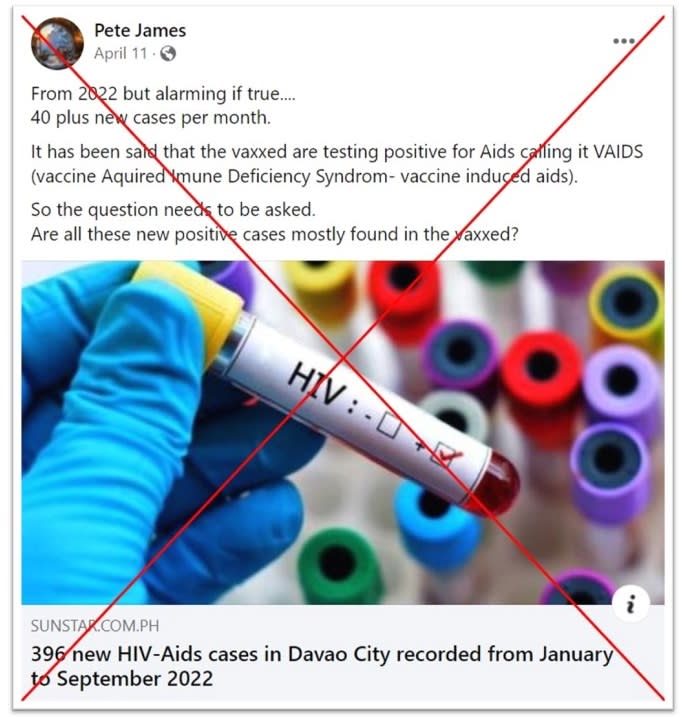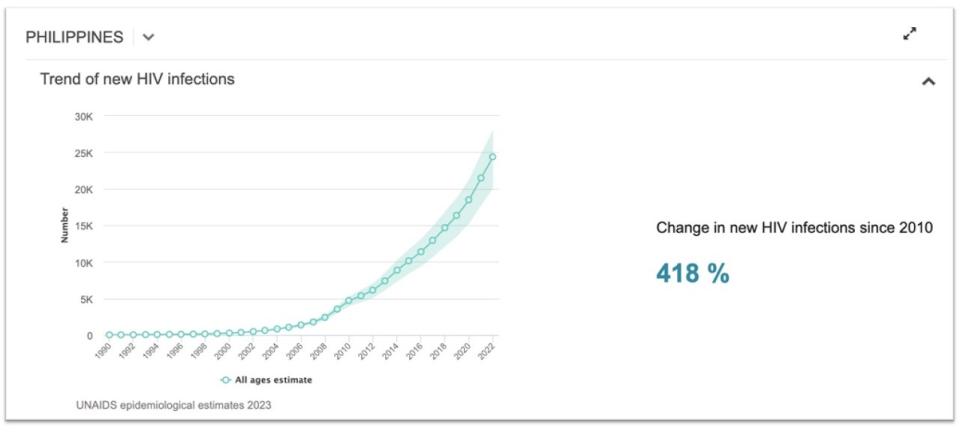Experts rubbish false claim linking Covid vaccines to HIV cases in southern Philippine city
"Vaccine-acquired immunodeficiency syndrome (VAIDS)" -- a term used to refer to a weakened immune system allegedly caused by mRNA vaccines -- is a "fictitious claim", infectious disease experts said, refuting social media posts that falsely linked an increase in HIV infections in the Philippines to the Covid-19 vaccines. UN data show HIV infections in the Southeast Asian country have been on the rise since the early 2010s, long before the coronavirus pandemic and the subsequent vaccine rollout.
"From 2022 but alarming if true.... 40 plus new cases per month," read the English-language caption of a Facebook post on April 11, 2024.
The post included a link to a December 2022 article by Philippine newspaper SunStar Davao, titled "396 new-HIV-Aids cases in Davao City recorded from January to September 2022".
The caption went on to claim that people vaccinated against Covid-19 were "testing positive for AIDS", referring to the condition as "VAIDS" or "vaccine acquired immune deficiency syndrome".

HIV infections have soared in the Philippines, with experts blaming the spread of online dating, poor sex education and conservative attitudes in the deeply religious country for fuelling the spread of the virus that causes the chronic disease AIDS.
Similar posts that falsely linked the spike to the Covid-19 vaccines were also shared on Facebook here, here and here.
But there is no such thing as "VAIDS", a term referring to the weakening of the immune system that surfaced in a flood of misinformation about the Covid-19 vaccines. AFP has debunked similar false claims about the made-up condition here, here and here.
Fictitious condition
"The term VAIDS is a fictitious claim that Covid vaccines can cause a form of AIDS-like immunodeficiency called vaccine-acquired immune deficiency syndrome," said Dr Edsel Maurice Salvana, an infectious diseases expert at the University of the Philippines' Institute of Molecular Biology and Biotechnology.
Salvana told AFP on May 31, 2024 the Covid vaccines did not have an HIV component and could not cause any mutations that could lead to similar infections.
"None of these vaccines have been shown to be mutagenic, and there is no scientifically plausible scenario where it can create an HIV virus or cause AIDS," he said.
Pre-pandemic rise
HIV cases were already on the rise across the Philippines, including in Davao city, since before the Covid-19 pandemic began in 2020, Salvana added.
While new infections globally fell 38 percent from 2010 to 2022, UNAIDS data show the Philippines saw a 418 percent increase, making it the fastest-growing HIV epidemic in the Asia-Pacific region and the fourth fastest in the world (archived link).
They also show the number of HIV cases in the country has been on the rise since the early 2010s, before the rollout of the Covid-19 vaccines.

Salvana added while there was a drop in the number of recorded AIDS cases during the pandemic due to decreased testing and less activity, these were eventually detected when pandemic restrictions in the country eased.
"There is no reason to believe that the rise in HIV cases is linked to the Covid vaccine because the increase in cases preceded the Covid vaccine rollout and the pandemic."
Dr Kris Claudette Trangia, the city's HIV/AIDS Program Coordinator at the Department of Health, told AFP on June 5, 2024 that there were 1,030 new AIDS cases reported from January to December 2023 in Davao -- up from 836 cases in 2022.
"This increase in the number of reported cases can be attributed to people becoming more aware of the HIV-AIDS services offered in our health facilities, and the importance of getting tested and knowing your status," Trangia said.

